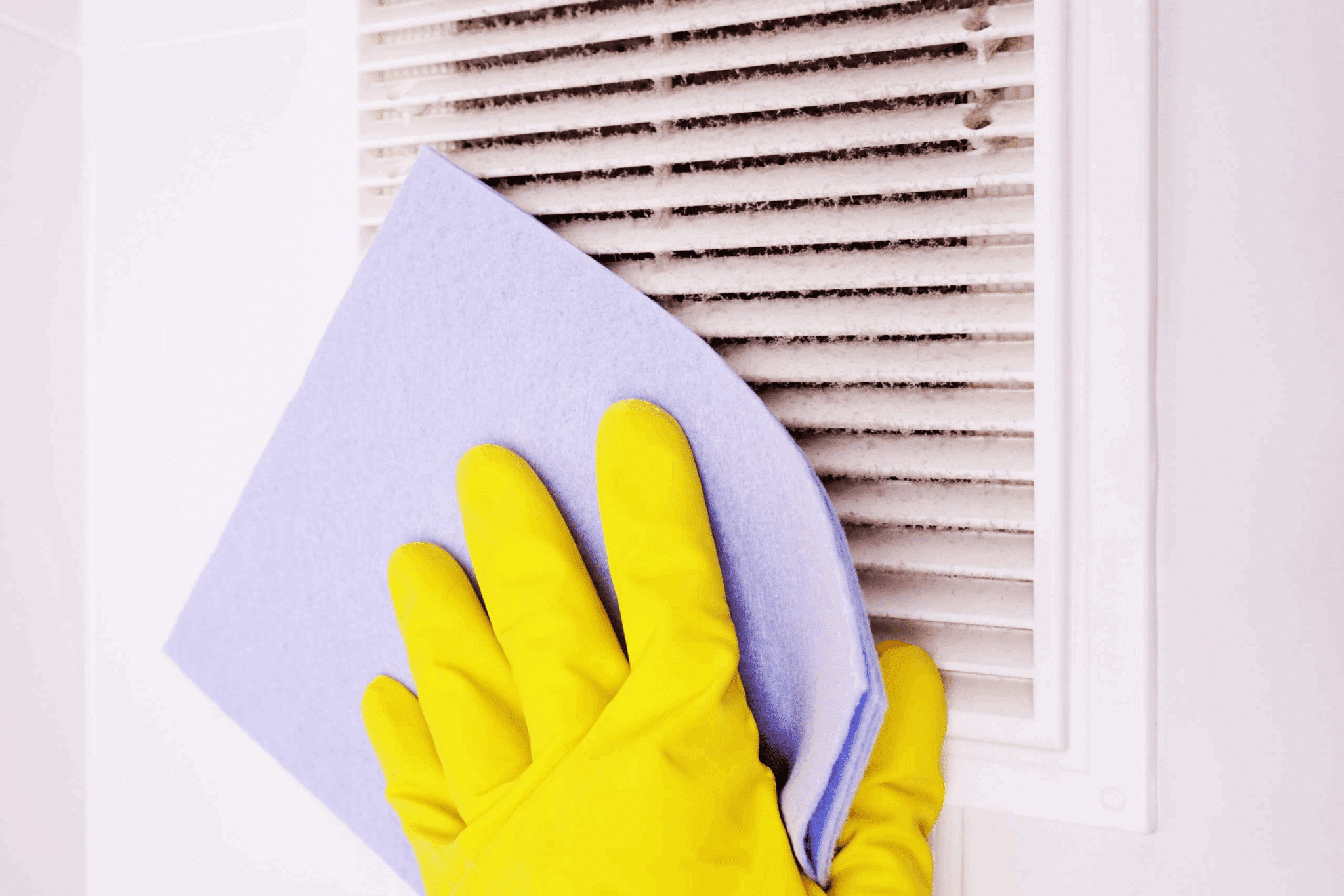If your child is still coughing, sneezing, or rubbing their eyes despite a consistently clean home, it may be time to look beyond surface-level cleaning. Dust, pollen, and other airborne irritants can build up in windows and air ducts, recirculating throughout your home and affecting the air your child breathes.
In this blog, we’ll break down the science behind indoor air quality for children, help you recognize common warning signs, and explain how duct and window cleaning for air quality can help eliminate invisible triggers right inside your home.
What is Indoor Air Pollution and How Does It Affect Your Child’s Health?
Your home’s Indoor Air Quality (IAQ) measures the concentration of contaminants in the air, including dust, mould spores, volatile organic compounds (VOCs), carbon monoxide, and fine particulate matter (PM2.5).
Without proper ventilation or routine maintenance, these pollutants can accumulate, circulate through your ductwork, and settle on window surfaces. Over time, this buildup can compromise your home’s air quality and increase the risk of your child developing allergies or respiratory issues.
Warning Signs That Your Home’s Air Quality May Be Harming Your Child

While signs of poor IAQ can be easy to miss as they can resemble common colds or seasonal allergies, they tend to worsen when windows are closed or the HVAC system is running. If symptoms improve outdoors or at school, that’s a strong indication the problem may be in your home’s air. Here are signs that your home’s air quality may be negatively affecting your child’s health:
- Chronic Cough or Congestion: If your child has frequent coughing fits at home that improve when they’re outdoors or away for the day, poor indoor air quality may be causing this.
- Itchy Eyes, Nose, or Skin: Dry indoor air or allergen buildup can trigger irritation in sensitive areas, especially around the eyes and nose. If the itchiness worsens indoors, it’s likely a response to airborne irritants like dust, pet dander, or pollen that has settled on surfaces or circulated through your HVAC system.
- Frequent Headaches or Fatigue: In poorly ventilated homes, carbon dioxide and airborne chemicals from things like paint, cleaning sprays, or carpets can collect over time. These pollutants may cause headaches for children, resulting in difficulty concentrating, irritability, or a general sense of sluggishness throughout the day.
- Worsening Asthma or Allergy Symptoms: Poor indoor air can particularly affect children with asthma or allergies. If allergens are constantly reintroduced into the air due to dirty ducts or windows, medication alone may not be enough to manage their symptoms. Without addressing the source, flare-ups are likely to continue.
- Trouble Sleeping or Restless Nights: When the air is dry or filled with airborne particles, it can irritate your child’s nasal passages and make it harder to breathe through the night. As a result, sleep becomes lighter and more fragmented, affecting their mood and energy levels the next day.
Importance of Duct & Window Cleaning for Air Quality

If you’re wondering how to improve home air quality, regular duct and window cleaning is one of the most effective places to start. These areas are often overlooked in routine cleaning schedules, but maintaining them can make a noticeable difference in how fresh your home feels and in creating a healthier, more supportive space for your child to rest, grow, and thrive.
Duct Maintenance Tips for Better Air Quality at Home
- Replace your HVAC filters regularly: Dirty filters restrict airflow and allow dust, pollen, and other irritants to circulate through your home. Swap them out every 1 to 3 months, or more often if you have pets or allergies in the household.
- Vacuum vent covers and surrounding areas: Dust and debris often gather around supply and return vents. Gently vacuum the covers using a brush attachment to prevent buildup from being pulled back into the system.
- Schedule professional duct inspections: Even if your ducts appear clean, contaminants may be hiding deep within the system. A professional inspection every 2 to 3 years can identify hidden mould, pest issues, or excessive debris.
- Ensure vents are unblocked: Avoid placing furniture, curtains, or rugs over vents. Restricted airflow can reduce efficiency and lead to stagnant, recirculated air.
- Seal duct leaks if necessary: Leaky ducts can draw in dust from attics or basements and reduce your HVAC system’s efficiency. A technician can test for leaks and seal them properly to improve air quality and performance.
How to Keep Your Windows Clean to Improve Ventilation
- Clean window panes and sills regularly: Dirt, pollen, and urban grime often build up on window surfaces. Wipe down the glass and frames at least once a month to ensure fresh air can flow freely when windows are open. This is an essential part of window cleaning for air quality, as buildup can impact both airflow and allergen levels indoors.
- Remove and clean screens seasonally: Dust, bugs, and pollen cling to window screens and reduce ventilation. Remove screens gently, rinse them with water, and let them dry fully before reinstalling. Clean screens allow cleaner air to pass through without obstruction.
- Check for mould or condensation: Excess moisture around window frames can create an ideal environment for mould, which negatively affects indoor air. Regularly inspecting window corners, sills, and tracks for condensation can help you catch issues early.
- Keep tracks and frames free of buildup: Window tracks often collect dust, pollen, and even dead insects. Use a soft brush or vacuum to clear debris so that windows open and close easily, improving air circulation and maintaining the function of your ventilation system.
- Schedule Professional Window Cleaning Services: Regular upkeep is important, but hard-to-reach or neglected windows may need more thorough care. Professionals can access higher windows, tackle built-up grime, and leave glass spotless using commercial-grade tools. Booking a professional window cleaning service every six months helps maintain air quality and light flow throughout the year.
Final Takeaway
The air inside your home plays a bigger role in your child’s health than most parents realize. From persistent allergy symptoms to restless sleep, many issues linked to poor indoor air quality can be improved by keeping windows and ducts clean.
With a few simple changes to your maintenance routine, you can take meaningful steps toward protecting your child’s respiratory health and creating a more supportive indoor environment.
















